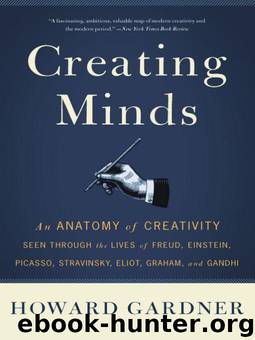Creating Minds: An Anatomy of Creativity as Seen Through the Lives of Freud, Einstein, Picasso, Stravinsky, Eliot, G by Howard E. Gardner

Author:Howard E. Gardner [Gardner, Howard E.]
Language: eng
Format: mobi
ISBN: 9780465027866
Publisher: Basic Books
Published: 2011-12-05T14:00:00+00:00
7
T. S. ELIOT: THE MARGINAL MASTER
Eliot, 1914
THE WASTE LAND RECOVERED
IN 1968 A MANUSCRIPT long thought to be lost was located in the Berg Collection of the New York Public Library. The packet consisted of fifty-four pages, most of them typed, but some handwritten on one or both sides. Some of the pages had few marks on them, while others were heavily edited by various hands, and several had been completely crossed out. The typed language itself was equally varied, with much of it in colloquial English, much of it in elegant or abstruse English, and scattered lines in a range of European languages as well as Sanskrit.
No ordinary manuscript, the recovered sheets were interim drafts of The Waste Land, arguably the most famous poem, and in all likelihood the most influential poem, in English of this century. T. S. (Thomas Stearns) Eliot, a St. Louis–born poet who had settled in England, had begun to write the poem, or verses that became a section of the poem, around 1914, and had finished a complete draft of nearly a thousand lines by the end of 1921. He had then given this draft to both his wife, Vivien,11 and a close friend, Ezra Pound, an American-born poet who had also settled in Europe. Along with Eliot, these “friendly critics” had made substantial changes to the poem, with Pound suggesting changes that reduced the poem to approximately half its length. In the words of the Eliot scholar Helen Gardner, “Pound turned a jumble of good and bad passages into a poem.”
Eliot appreciated immediately the significance of Pound’s help. Confident that the poem would be regarded as a significant work, Eliot presented the manuscript as a gift to an American agent, John Quinn, who had ably (and without charge) represented Eliot’s publishing interests in the United States. Quinn died in the year following the receipt of the manuscript, and during his estate’s disposition, the manuscript was misplaced; indeed, Eliot came to believe that it had been lost. Its discovery forty-five years later not only solved a literary mystery; it has also provided unique insights into the genesis of a major literary work, revealing the role that a sympathetic but candid critic can play. And it has also crystallized the question of why a pair of young American expatriates would be writing about the decline of civilization from their vantage point following the Great War.
Download
This site does not store any files on its server. We only index and link to content provided by other sites. Please contact the content providers to delete copyright contents if any and email us, we'll remove relevant links or contents immediately.
The Art of Coaching Workbook by Elena Aguilar(50113)
Trainspotting by Irvine Welsh(21030)
Twilight of the Idols With the Antichrist and Ecce Homo by Friedrich Nietzsche(18303)
The Secret History by Donna Tartt(18168)
Cat's cradle by Kurt Vonnegut(14763)
All the Missing Girls by Megan Miranda(14749)
Ready Player One by Cline Ernest(13996)
Talking to Strangers by Malcolm Gladwell(12881)
Fangirl by Rainbow Rowell(8790)
The Compound Effect by Darren Hardy(8521)
Thirteen Reasons Why by Jay Asher(8457)
The remains of the day by Kazuo Ishiguro(8399)
Periodization Training for Sports by Tudor Bompa(7928)
Tools of Titans by Timothy Ferriss(7818)
Wonder by R. J. Palacio(7745)
The Lover by Duras Marguerite(7588)
Change Your Questions, Change Your Life by Marilee Adams(7381)
A Court of Wings and Ruin by Sarah J. Maas(7269)
The Complete Stick Figure Physics Tutorials by Allen Sarah(7144)
